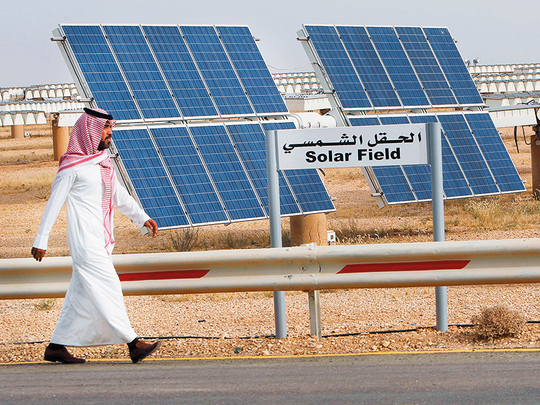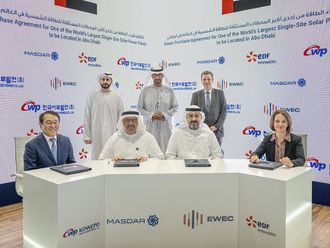
London
Saudi companies are looking to solar electricity to hedge the risk of rising power prices if energy subsidies are cut, according to one of the Kingdom’s biggest plant developers.
“Everybody is very convinced that electricity prices are going to be reformed over the next three years,’’ ACWA Power International Chief Executive Officer Paddy Padmanathan said in an interview in Paris. “That means only one thing: that tariffs are going to go up.’’
Saudi Arabia is in the midst of implementing its Vision 2030 master plan to wean its economy off oil and diversify into other industries. Crown Prince Mohammad Bin Salman has enacted policies to shake up the country, from a proposed initial public offering of Saudi Arabian Oil Co. to allowing women to drive. Part of his changes may eventually include rolling back energy subsidies that keep a cap on fuel and power prices.
Saudi Arabia set a record October 3 in its first solar tender, drawing bids of just 1.79 cents a kilowatt-hour, a quarter lower than previous prices for the cheapest solar energy in the world. AWCA will be participating in a tender next week to provide a food processing firm with a “significant amount” of solar power that will come in below 100 megawatts, according to Padmanathan.
Clean power purchase agreements between corporations and project developers are already big business in markets like the US and the Nordics. Companies such as Facebook Inc, Apple Inc and Amazon.com Inc are inking contracts that fix a price on their power. Now, Saudi companies are becoming interested in that approach.
“Everybody is starting to think, why don’t I get renewable energy procured and directly into my system now as quickly as I can,’’ the ACWA CEO said. “This tender is a first off, but there are several others that are preparing tenders like this.’’
Padmanathan is expecting the market for private renewable energy contracts in Saudi Arabia to ramp up to several hundred megawatts a year, taking as much as 2 gigawatts of demand off the country’s central power generation in as little as four years.
It is “what the future of the electricity consumption will look like in terms of energy consumption,” Padmanathan said. “Inevitably what you will find will be a very significant amount of renewable energy.”












